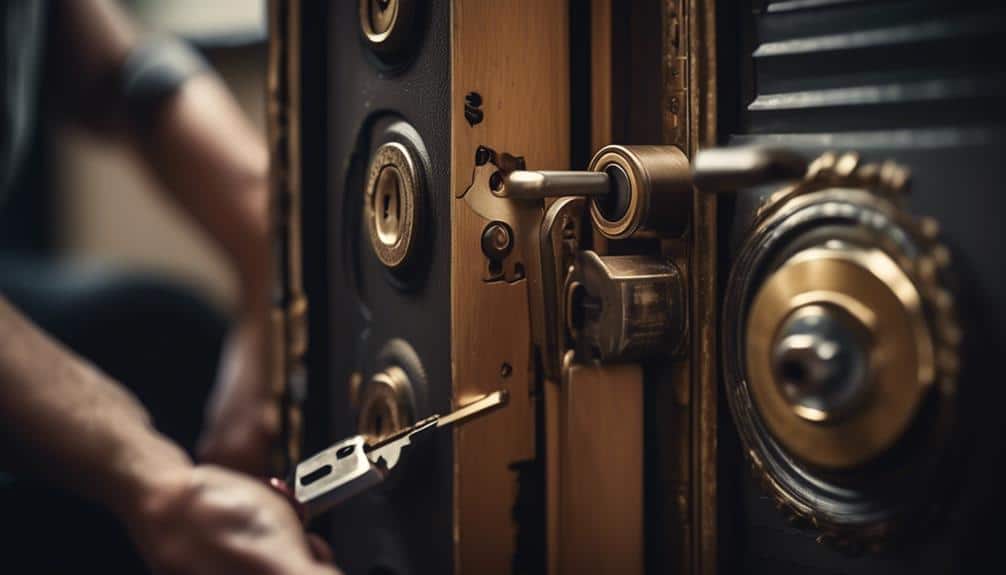Have you ever found yourself locked out of your own home due to a broken lock? It's a frustrating situation that can leave you feeling vulnerable and inconvenienced. But worry not, because our team of expert residential lock repair professionals is here to restore your broken locks and provide you with peace of mind.
With our extensive knowledge and skillset, we are dedicated to ensuring the security of your home. But what are the common causes of broken locks? And how can you identify the signs of a malfunctioning lock?
Join us as we explore the importance of timely lock repair and the professional process we employ to restore your locks to their former glory. Don't let broken locks compromise the safety of your home; let us handle it for you.
Common Causes of Broken Locks
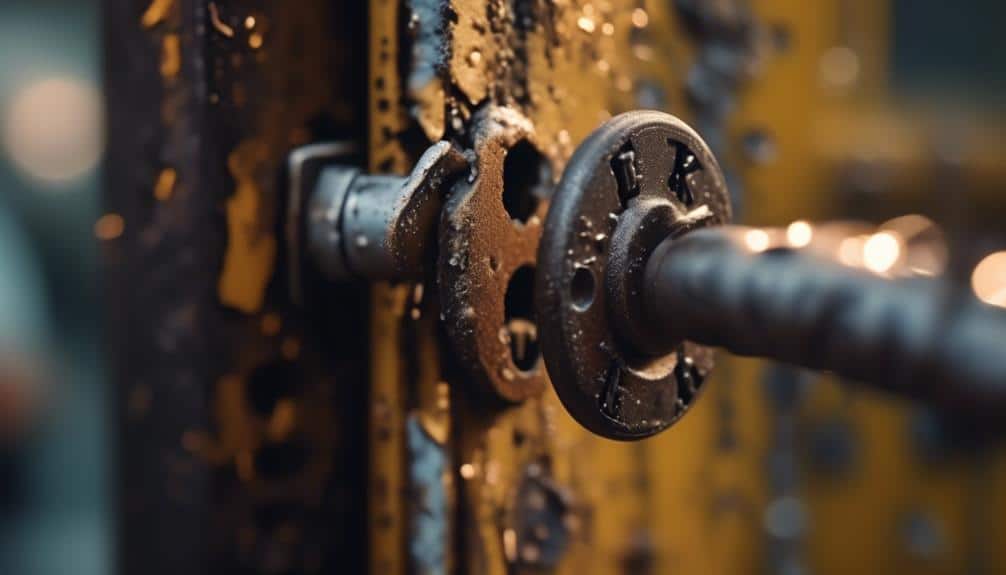
Broken locks can be caused by a variety of factors, including wear and tear, improper maintenance, and attempted break-ins. Lock maintenance plays a crucial role in preventing lock failures and ensuring the security of our homes. Regular maintenance involves cleaning the lock mechanism, lubricating moving parts, and inspecting for any signs of damage or wear. Proper maintenance can extend the lifespan of locks and reduce the need for costly repairs or replacements.
However, despite our best efforts, locks may still break down over time. Wear and tear is a common cause of lock failure, especially in older locks or those subjected to heavy use. The constant turning of the key and the repeated locking and unlocking can cause internal components to wear out or become misaligned.
Improper maintenance can also lead to broken locks. Neglecting to clean and lubricate the lock regularly can cause dirt and debris to accumulate, hindering the smooth operation of the lock. Additionally, using the wrong type of lubricant or applying too much can cause sticky or gummy locks, leading to potential malfunctions.
Another factor that can cause broken locks is attempted break-ins. Burglars may use forceful methods to gain entry, such as picking or drilling the lock. These attempts can damage the lock mechanism, rendering it inoperable.
When faced with a broken lock, some homeowners may consider DIY lock repair. While it may seem like a cost-effective solution, it's important to exercise caution. Inexperienced handling of locks can cause further damage or compromise the security of the property. It's advisable to seek professional assistance from a locksmith who's the knowledge and expertise to properly repair or replace the broken lock.
Signs of a Broken Lock
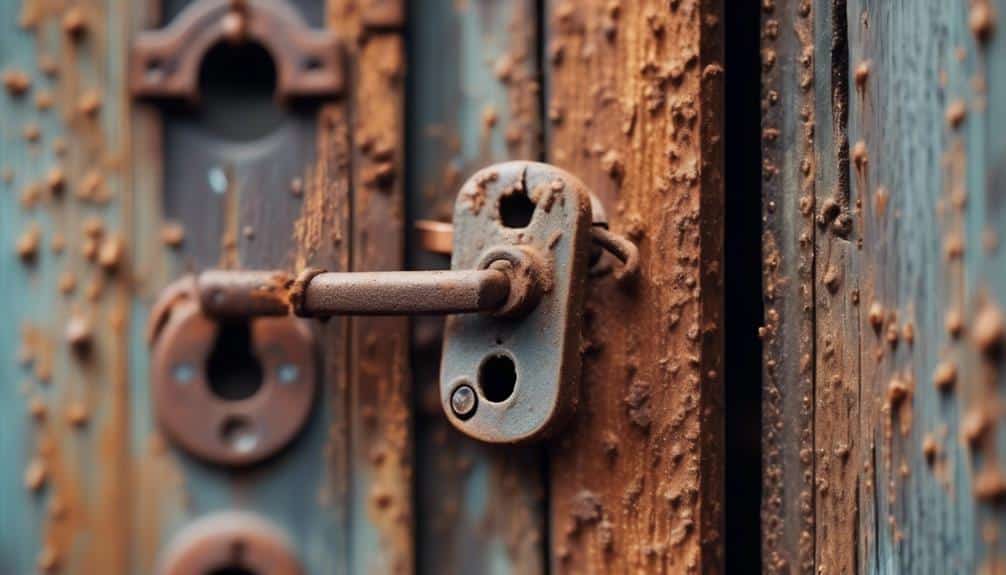
A malfunctioning lock may exhibit various indications that it's no longer functioning properly. As experts in lock maintenance and repair, we've identified several signs that homeowners can look out for.
One of the most obvious signs is difficulty in turning the key. If you find yourself struggling to insert or turn the key smoothly, it may be an indication of a broken lock.
Another sign is a loose or wobbly handle. A properly functioning lock should have a handle that's securely attached and doesn't move or jiggle. If the handle feels loose or unstable, it could be a sign of internal damage.
Additionally, if the lock mechanism feels stiff or sticky when you try to operate it, it may be a sign of dirt, debris, or rust inside the lock.
Lastly, if you notice any visible damage to the lock, such as cracks, dents, or signs of forced entry, it's important to address the issue promptly.
While some homeowners may attempt DIY lock repair, it's recommended to seek the assistance of a professional locksmith to ensure proper and lasting repairs.
Importance of Timely Lock Repair
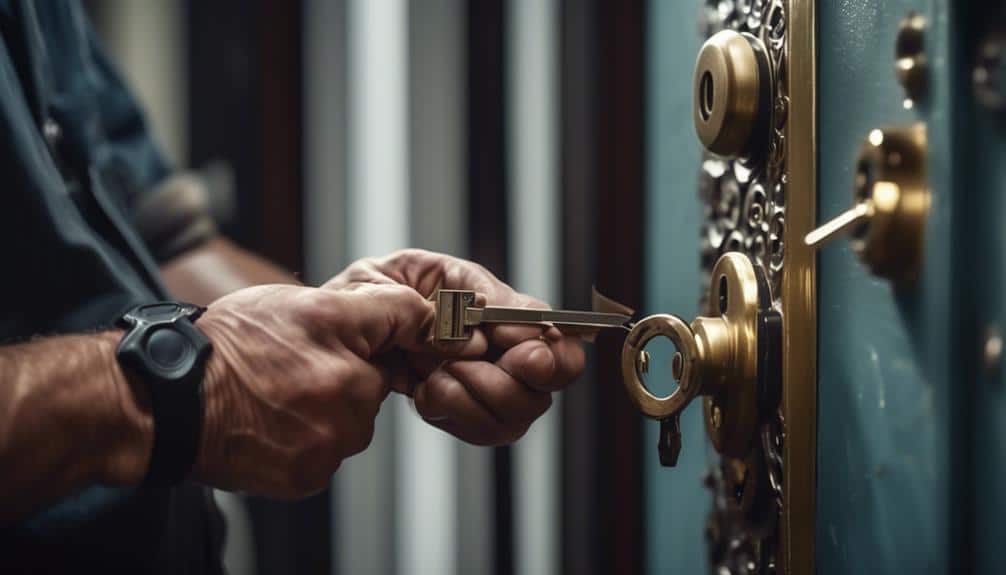
Timely lock repair is crucial for maintaining the security and functionality of your residential property. Hiring a professional locksmith offers several benefits when it comes to repairing locks.
Firstly, professionals have the necessary expertise and experience to accurately diagnose and fix any issues with your locks. They can identify underlying problems that may not be obvious to an untrained eye, ensuring that the repair is done correctly the first time.
Additionally, professional locksmiths have access to specialized tools and equipment that allow them to perform repairs efficiently and effectively.
One common misconception about lock repair is that it can be easily done as a DIY project. While it may seem simple, attempting to repair locks without proper knowledge and training can actually cause further damage. This can lead to more expensive repairs in the long run.
Another misconception is that lock repair isn't a priority and can be put off. However, neglecting timely lock repair can compromise the security of your home and make it more vulnerable to break-ins.
Professional Lock Repair Process
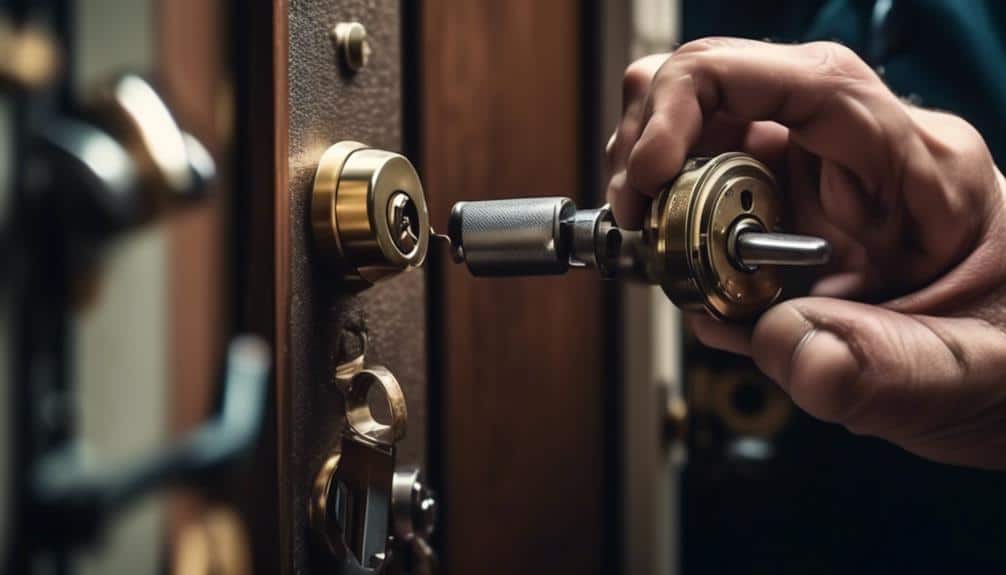
To initiate the professional lock repair process, a trained locksmith will thoroughly assess the condition of the lock and determine the most appropriate course of action. This step is crucial to ensure that the lock is repaired effectively and efficiently. The locksmith will first inspect the lock for any visible signs of damage, such as broken or worn-out parts. They will then evaluate the internal mechanism of the lock to identify any underlying issues that may be causing the malfunction.
Once the assessment is complete, the locksmith will proceed with the necessary repairs. This may involve replacing damaged components, lubricating the lock, or adjusting the alignment of the lock mechanism. The specific repairs will depend on the type and extent of the damage.
To give you a clearer understanding, here is a table summarizing the steps involved in the professional lock repair process:
| Step | Description |
|---|---|
| 1. | Thorough assessment of the lock condition |
| 2. | Identification of visible and internal damage |
| 3. | Repair or replacement of damaged components |
| 4. | Lubrication and adjustment of the lock mechanism |
Preventing Future Lock Damage
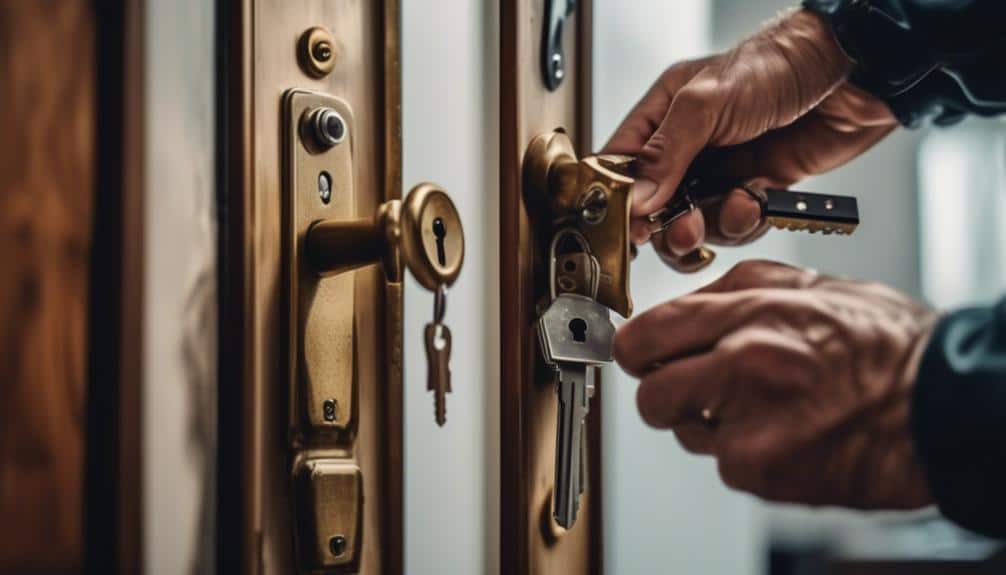
To prevent future damage to your residential locks, it's important to establish a regular maintenance routine that includes inspections and proper lubrication. By following some simple lock maintenance tips, you can ensure the longevity and optimal performance of your locks.
Firstly, it's crucial to regularly inspect your locks for any signs of wear, damage, or misalignment. Look for loose screws, rust, or any other visible issues that may affect the functionality of the lock. If you notice any problems, address them promptly to prevent further damage.
Secondly, proper lubrication is essential for the smooth operation of your locks. Use a high-quality lubricant specifically designed for locks, and apply it sparingly to the keyway and other moving parts. Avoid using excessive amounts of oil or grease, as this can attract dirt and debris, leading to lock jams.
Additionally, it's important to avoid using harsh chemicals or excessive force when attempting DIY lock repair techniques. These can cause further damage and compromise the security of your locks. If you encounter a lock problem that you're unsure how to handle, it's best to consult a professional locksmith.
Frequently Asked Questions
Are There Any DIY Methods for Fixing a Broken Lock?
When it comes to DIY lock repair, there are a few methods that can be attempted. However, it's important to note that these methods may not always be effective and could potentially cause further damage.
Common causes of lock breakage include worn-out components, improper maintenance, and attempted break-ins. If you aren't experienced in lock repair, it's recommended to seek professional assistance to ensure the lock is properly fixed and your security isn't compromised.
How Much Does It Typically Cost to Repair a Broken Residential Lock?
When it comes to repairing a broken residential lock, the cost can vary depending on several factors. Factors such as the type of lock, the extent of the damage, and the complexity of the repair can all contribute to the overall cost.
While some may consider a DIY approach to save money, it's important to note that hiring a professional locksmith ensures a proper and reliable fix.
Ultimately, the cost of repairing a broken residential lock will depend on these factors and the chosen approach.
Can a Broken Lock Be Repaired, or Does It Need to Be Replaced?
When a lock is broken, it's important to assess whether it can be repaired or if it needs to be replaced. There are several factors to consider, such as the extent of the damage and the type of lock. Common causes of broken locks include worn-out components, improper maintenance, and attempted break-ins.
Signs that indicate a lock can be repaired rather than replaced include minor damage, functioning keyways, and intact lock mechanisms. It's always recommended to consult a professional locksmith to determine the best course of action.
Is It Possible to Prevent a Lock From Breaking in the First Place?
Preventive measures are crucial in ensuring the longevity of locks.
By taking proactive steps, we can minimize the risk of locks breaking.
Common causes of lock breakage include excessive force, improper maintenance, and wear and tear.
To prevent lock breakage, regular inspections and lubrication are recommended.
Additionally, avoiding excessive force when operating the lock and promptly addressing any issues can help prolong its lifespan.
Implementing these preventive measures can significantly reduce the likelihood of a lock breaking in the first place.
Are There Any Temporary Solutions to Secure a Broken Lock Until It Can Be Repaired?
When dealing with a broken lock, it's important to find temporary solutions to keep our homes secure.
While waiting for a professional repair, we can explore alternative lock options such as padlocks or chain locks.
These options provide a temporary fix to keep our homes safe until the broken lock can be properly repaired.
It's crucial to remember that these solutions are temporary and should be replaced with a fully functioning lock as soon as possible to ensure optimal security.

